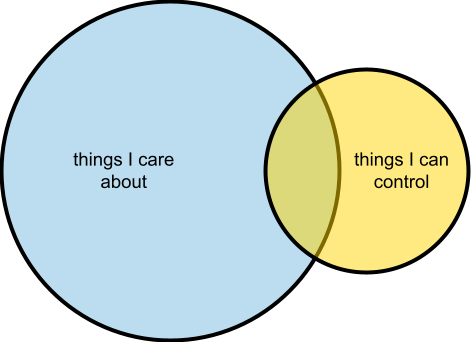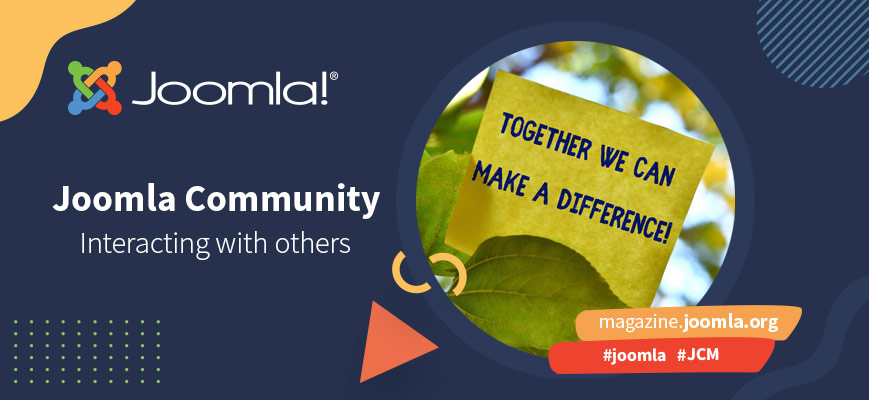Joomla and the Art of Solving Infinite Problems
There are two circles. One represents all the things that I care about. The other represents all the things over which I have control. The circle of things that I care about tends to be quite a bit larger than the one that I have control over. This is true of almost everyone.
Fortunately my circles overlap to some degree.

I do also have some things that I control that are not all that important, like my unorganized garage. I have quite a few things that I care about a lot, but over which I have very little control, things like American foreign policy. The sweet spot is where the two circles overlap. These are things that I care about and things that I have some control over, like how my children are raised.
Everything above is borrowed heavily from Steven Covey’s “7 Habits of Highly Effective People” [1]. Covey actually refers to them as circles of influence and circles of concern. In truth, both of my circles represent gradients. I care more about how my children are raised than I do about what I am having for dinner. I care about both, just with dramatically different levels of intensity. My degree of control over both of these items also varies. I suppose we could talk about clouds rather than spheres or circles. In any event, you get the idea.
I take pains to illustrate this Venn diagram, because I think it has great insights for an open-source, volunteer-based project like Joomla.
Meaningful and productive
As a project there is a sphere of influence that we have in the world. There is also a certain amount of control that we have over the effectiveness of our software and our community. Joomla is actually a collection of individuals each with their own circles. The impact that we have as a project is a measure of how well our individual concerns and efforts align.
We can look to our Values, Vision, and Mission to help assess how well we are aligned, but for the present conversation I want to be more pragmatic.
First it is important to note that what we want to happen within Joomla will always exceed the resources available to complete that work. Constraints are not unique to volunteer organizations. Every business, government, club, etc. on the planet wishes they had more resources to accomplish their goals.
How do we make the most of the collective resources (mostly volunteer effort) that we do have? The time, creativity, and energy that people invest need to be meaningful and productive. People volunteer because they want to make a positive difference.
Overcoming the ‘gumption traps’
As the Joomla organization adds more volunteers, our collective aspirations will almost always outpace our collective ability to contribute. And since what we wish to accomplish is always more than what we can accomplish by ourselves, “You know what someone (else) should do,” is heard and felt more often than, “Here is what I am able and willing to do”. Everyone has a large vision for what they would like to see accomplished. It is not as easy to find the time, resources, and consensus necessary to actually get all those things done.
This creates a gumption trap; an event or mindset that can cause one to lose the enthusiasm necessary to complete a project (as described by Robert Persig in Zen and the Art of Motorcycle Maintenance). Gumption traps can be found everywhere in open source projects. How do we avoid them or mitigate their effect?
First, it is important that we all recognize the reality that our problem set is nearly infinite and our resources are finite. This at first seems overwhelming to the point of despair. A deeper analysis affords the perspective that we are all sharing an experience of ongoing improvement. We participate in the act of making the world a tangibly better place over time. If we are doing well, the software and the community that creates it both get better and better over time. The joy is in sharing in and contributing to that process.
The second observation grows from the first. Everyone can be doing more and doing better. How do we create an environment that encourages and supports that growth? When something is not living up to our expectations, are we setting or removing gumption traps for others? Are we more likely to offer criticism or help when someone is struggling? Do our actions and interactions encourage or discourage others' contributions?
Self reflection and greater self control
We can literally multiply our own volunteer effort many times over by how we interact with others. We can encourage, help, train, recruit, teach, and support other volunteers. Conversely, it is possible to be a substantial individual contributor and provide a net loss of goodwill, enthusiasm, and volunteer effort to Joomla. It is hard to make up for lost effort if people stop contributing because it just is not worth the criticism and the hassle.
Before we get out our scorecard to decide who fits where, my last observation is on self reflection. I have shared all of the above to encourage my own humility and yours. If the first impulse is to score where others fall, you have missed the point. There are few things as destructive to our productivity and sense of community as valuing criticism over self reflection.
I have two circles in my life. One represents the things I care about. The other represents the things over which I have control. The thing over which I have the most control is how effectively I interact with others. If I do this well, I am aligned with what Joomla values, and it gives us all greater control in making our software, our community, and our world a better place.
________________
[1] This pdf provides a summary of Covey’s treatment of these concepts in a little more detail - https://dplearningzone.the-dp.co.uk/wp-content/uploads/sites/2/2015/06/Covey.pdf
Some articles published on the Joomla Community Magazine represent the personal opinion or experience of the Author on the specific topic and might not be aligned to the official position of the Joomla Project
By accepting you will be accessing a service provided by a third-party external to https://magazine.joomla.org/
 Community Magazine
Community Magazine 
Comments 2
Thanks Brian, I always love your insights. Fantastic article.
Hey Eoin, I appreciate the affirmation. I want to be encouraging others to contribute what they can, where and when they can. To do that we need an environment that is more about helping and less about criticism. Of course both dynamics are already present, I just feel that we need more of the former and less of the later.